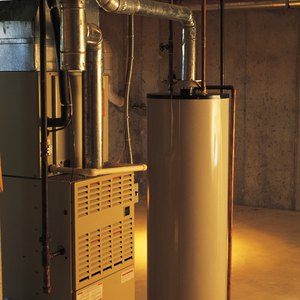
The American Recovery and Reinvestment Act offered homeowners a variety of ways to cut their taxes while making their homes more energy efficient. Residential energy tax credits originally allowed during 2009 and 2010 were extended through 2011, with reduced limits. Owners of rental property are not eligible for the special tax credits, but can still write off the cost of replacing old equipment through depreciation. Your new boiler might be eligible for a tax break.
Residential Energy Tax Credits
Determine whether your new boiler qualifies for the credit. You must install the new equipment by Dec. 31, 2011. Gas, oil and propane water heaters with an Energy Factor greater than 0.82 or with a thermal efficiency of at least 90 percent qualify. The credit covers only new furnaces in your existing main residence. New construction and rental properties do not qualify.
Deduct the cost of your new boiler on Form 5695, Residential Energy Credits. For 2009 and 2010, you may deduct 30 percent of the total cost of qualifying appliances, including installation, up to $1,500, for equipment installed by Dec. 31, 2010. For 2011, the maximum is reduced to 30 percent of the cost, up to $500. Write the cost of the new equipment on line 3b of Form 5695.
Fill in the cost of other allowable energy-efficient appliances on Form 5695 and total the amounts. If you own a share of your main residence with someone besides your spouse, your maximum deduction is limited to the smaller of 30 percent of the amount you actually spent on the installation or $500 times your share in the home. For example, if your new boiler cost $1,000, but you only own a 50 percent share in the home, your maximum deduction is $150 (30 percent x $1,000 x 50 percent share), rather than $300.
Transfer the total allowable deduction from line 11 of Form 5695 to Form 1040, line 52. This amount is subtracted from any tax you owe. If the credit reduces your tax bill to zero, you will not get a refund for the difference.
Deduction for a Rental Property
Use Schedule E (Supplemental Income and Loss) to deduct the cost of purchasing and installing a new boiler in your rental property. Any investment that adds to the value or life of the property is considered an improvement for tax purposes. A new boiler, especially an energy-efficient one, would fall into this category.
Add the total cost of purchasing and installing the new boiler to the basis of the rental property. Additions to basis are depreciated with the property.
Calculate depreciation on the property, including the additional basis amounts starting in the month the boiler was installed. See IRS instructions for Form 4562 for depreciation tables.
Transfer the total depreciation, including improvements, to line 20 of Schedule E.
Tips
If you failed to take the credit for a new boiler bought in a prior tax year, you may file an amended return for that year on Form 1040X, including Form 5695. You will receive a refund for any overpayment of tax for the year in question.
References
Tips
- If you failed to take the credit for a new boiler bought in a prior tax year, you may file an amended return for that year on Form 1040X, including Form 5695. You will receive a refund for any overpayment of tax for the year in question.
Writer Bio
Naomi Smith has been writing full-time since 2009, following a career in finance. Her fiction has been published by Loose Id and Dreamspinner Press, among others. She holds a Master of Science in financial economics from the London School of Economics and a Bachelor of Arts in political economy from the University of California, Berkeley.

